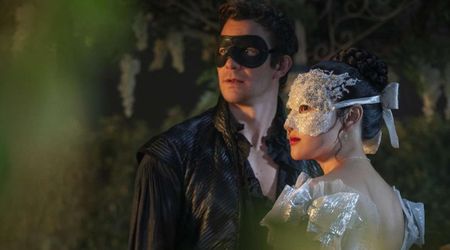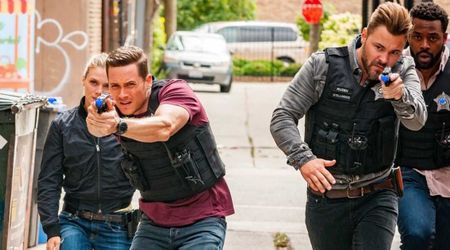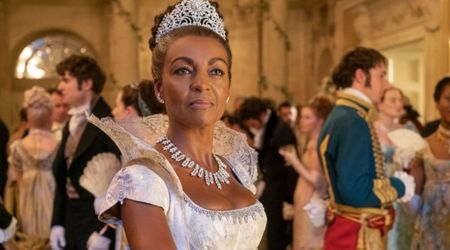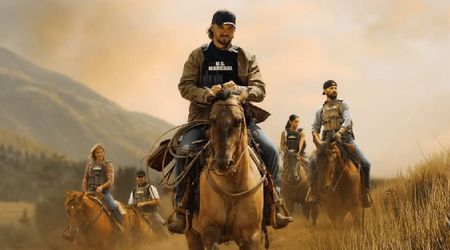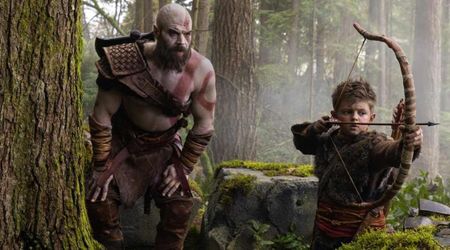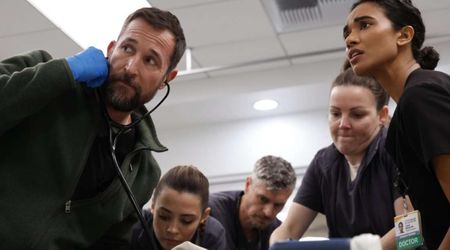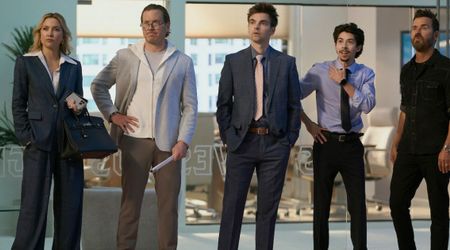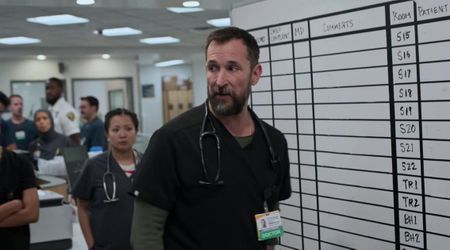Erik Anders Lang on the spiritual connection behind golf and how he likes to go with the flow

I remember looking up Erik Anders Lang and thinking, 'Wow, so he was married to Sia.' I almost immediately felt bad about it because that's not how one deserves to be remembered — by the status of their relationship with another famous personality. Instead, it should be through the virtue of their own achievements, and Erik has more than a few to his name.
He's taken quite an interesting career path to get to where he is right now — hosting the international golf series 'Adventures in Golf,' whose third season premieres in July and the podcast 'The Erik Lang Show: Golf - Travel - Comedy,' which features celebrity and pro golfer interviews — and despite what I imagine is a packed schedule, he made time to talk on the phone to discuss all things golf, his take on life, and his future projects.
A golf virgin, I asked him to tell me more about his show and how he came about the unique idea to travel around the world and gather golfing stories from different cultures.
"It started off as kind of a random idea," he said. "I never really wanted to be a host and it was like 'Hey, do you want to host a show, and if so, what would it be?' and I was like 'Yeah, I'll try anything.' and the idea came out of something that I would probably do for free."
But 'Why the craziest stories?' I queried. "Ever since I got interested in golf, I found these sorts of stories of the way people play golf differently around the world to be fascinating. I originally thought that I would make a movie out of it but it wasn't a befitting format as they're all mini-chapters in their own right. So, the idea that you're putting up short film content on YouTube made a lot of sense and the PGA saw that and agreed with me and we began making it," he confessed.
The quest to find the most intriguing stories from around the world has taken Erik to a multitude of countries from India to Scotland to Ireland to Dubai to even Japan. But I was curious as to which amongst those would rate as his favorite.
"Tough question, because as a golfer, I have a deep love affair with Scotland, which is where golf began," he said. "There's a logistical element to the country that makes a lot of sense for a traveler: there are big cities, there's culture, there are schools, there are museums and there are also small towns where everyone's warm and friendly," adding that Tokyo was also a unique experience.
However, he revealed that it was India -- where he has shot for two episodes -- that he found to be the most exhilarating.
"I had gone to a military base in India in the Ladakh region, wonderful and beautiful, and right up there between Afghanistan and China. It was hard. It was beautiful. It was a culture clash. It was elevation. It was the time change. It was the language barrier. And it was also one of the earlier episodes we shot and so, the show still didn't have much of a format or a programme and we didn't understand the things we do now after 25 episodes."
Though refuting the elitist tag of the sport, Erik conceded that the sport was not as popular in the country as it could be.
"In India, in general, golf is not the most popular sport. India itself is this huge culture clash of high and low, and the middle class is unlike that in America, where even the lower end of that middle class can play golf at public courses for relatively low prices. You aren't wrong in saying that there is a cultural bridge to get into golf and the aim of my show is to break that stigma down and get more people to try it."
Erik is also completing a feature-length documentary titled 'Be the Ball,' which features interviews with celebrities such as Bill Murray and Samuel L. Jackson and explores a side of golf that I did not believe existed: the spiritual. He called it the 'greatest sports experiment ever conducted.' I, however, was initially skeptical about this connection.
"When I started playing golf, I thought like you did. That it was a game for rich, white people who leaned towards the conservative side. But what happened then is that I came to a few realizations and experienced a few things that opened up my mind up to different possibilities," he said.
It was then that he brought my attention to a 2000 sports drama directed by Robert Redford called 'The Legend of Bagger Vance,' which he credited for his change in perception.
Based on Steven Pressfield's 1995 book 'The Legend of Bagger Vance: A Novel of Golf and the Game of Life' the movie starred Will Smith and Matt Damon in the titular roles of Bagger Vance and Rannulph Junnah respectively.
Erik told me that the film had more similarities to the Hindu sacred text, 'Bhagavad Gita,' than initially meets the eye.
"I watched the movie and I was like 'Whoa, it's all mystical!' and then I found out that the movie is based on the Bhagavad Gita. Rannulph Junnah is a play on words. He's referred to as R. Junnah, which is a play on words of Arjuna, who is one of the primary characters in the text. It was a clever way of disguising the origin."
"Will Smith's character as the caddie was loosely based on Vishnu and he would approach Junnah in the middle of the night and offer him advice. Junnah had to kill all of these other golfers, metaphorically speaking, as well as his inner demons. So, Vishnu came in and gave him the inspiration and direction to do so," he said, pointing out how in the epic, the God had helped Arjuna follow his path as the warrior and the hero that he was meant to be. So that was a big inspiration for me as well."
Murray and Jackson are arguably one of the biggest stars that Hollywood has to offer today, so what did they have to say when they sat down to talk about golf?
"They love to golf," Erik said. "We talked about why they love golf, what they get out of it and why they're addicted to it. The movie is an experiment into whether or not meditation helps your game." I asked whether it does, and he confirmed that they managed to prove it. In fact, he even completed an accredited study measuring the change in brain size and improvement of golfers over a 12 week period after completing a meditation program.
We got to talk about his podcast as well. Personally, I have never been a big fan of the format and it's increasingly rare that you find those that can differentiate themselves from the crowd, whatever the topic may be. Many golf podcasts on the internet talk about how one can go about improving their game, mentally and physically, so what was it that made his different from the rest? The answer was surprisingly straightforward and simple.
"I try to talk to golfers about their lives and actors about the way they play golf," he laughed. "Entertainers who love golf have a different job in real life, so I try to bridge that cross-section of that. For me to interview a golfer about golf is quite redundant. We've already heard that. So I want to talk to golfers about their laundry, about their shoes, the way they spend their time," he clarified.
Erik also has ambitious plans for the future of the sport. "I'm interested in starting up a way for golfers to have a way to unite on their own and become a group within themselves," he said. "There are so many different types of golfers and I found these niche of people who like to travel, and who like to meet new people, and like to ponder the deeper part of the game, and that's something I find very interesting and I'm working towards that."
It's not just these entertainers who want to escape the hustle and bustle of their daily lives. Erik found his home in golf after a career that spanned a diverse range of industries. He started out as a waiter in New York City and successfully navigated his inherent talent for photography to earn the mentorship of world-renowned photographer David LaChapelle. He then found himself leading shoots for major publications himself, capturing a documentary of Japanese contemporary artist, Takashi Murakami, before moving on to find his niche on the golf course.
Why the constant transitions, I questioned?
Erik thought for a little while before replying: "Good question. A lot of life is this kind of experience of looking at your own intuition, going through open doors and not standing at closed doors. We make plans and end up going with whatever happens on that day. We can have a plan for a vacation but, ultimately, the best part of that vacation is unplanned. And so it is with our life and our career paths and the location that we choose to spend our lives chasing. A lot of that was merely trying to stay in the center. Deepak Chopra talks about 'the source' and this source is this place where coincidences occur and where things just happen."
Naturally, I asked whether this meant that it was entirely possible for him to move on to another field in the future. "Of course it's possible," he calmly replied. "At the time, I'm not busy making plans and am just eating the food that's in front of me and being very grateful to the wonderful career I've had up until this point."
So, you just 'go with the flow,' I said, to which he chuckled and replied, "Exactly, you should definitely try your hand at golf. You'd be good at it!"
It's not as though Erik would be short of options if he decided to switch careers again either. His nomadic professional life has seen him work in music as well, something I was particularly interested in, and having shot videos for the likes of Moby, I had little doubt that he boasted of some eclectic tastes. "I like Indie music, I like pop music, I like jazz, I like hip hop, I like country, I like classical, I really like rock," he said.
He continued: "The main thing about music is, at least from the perspective of how movies work and how films work, is that music isn't just something to listen to but a way to view the world. So, when you're driving along and the landscape looks a certain way, and the lighting looks a certain way and you're driving at a certain speed and you have certain feelings based on what just happened or whatever is about to happen, or whatever is happening, the music if used correctly, it becomes a magnifying glass to whatever you're experiencing."
It was time for the last question.
Boasting of so much experience of switching careers himself, what could he tell someone who had grown disillusioned with their own and wanted a change of scenery?
"It's this idea that following the next open door and going through it and asking for advice not just from people but from the universe," he explained. "I think we all have, inside of us, the answers, and I think that going about switching your careers is simple. I think a lot of people make it complicated. I think one of the things complicated about it is that it involves risk and it involves danger. It involves financial failure. It involves leaving something potentially secure and leaping into something insecure and potentially dissatisfying."
He continued: "If we operate our lives on those morals, we create more of those feelings. We need to jump and imagine that it's all going to be exactly as we want it to be and while it's not the easiest thing to do when we learn to do it, we become the star of the movie that we've also written."

